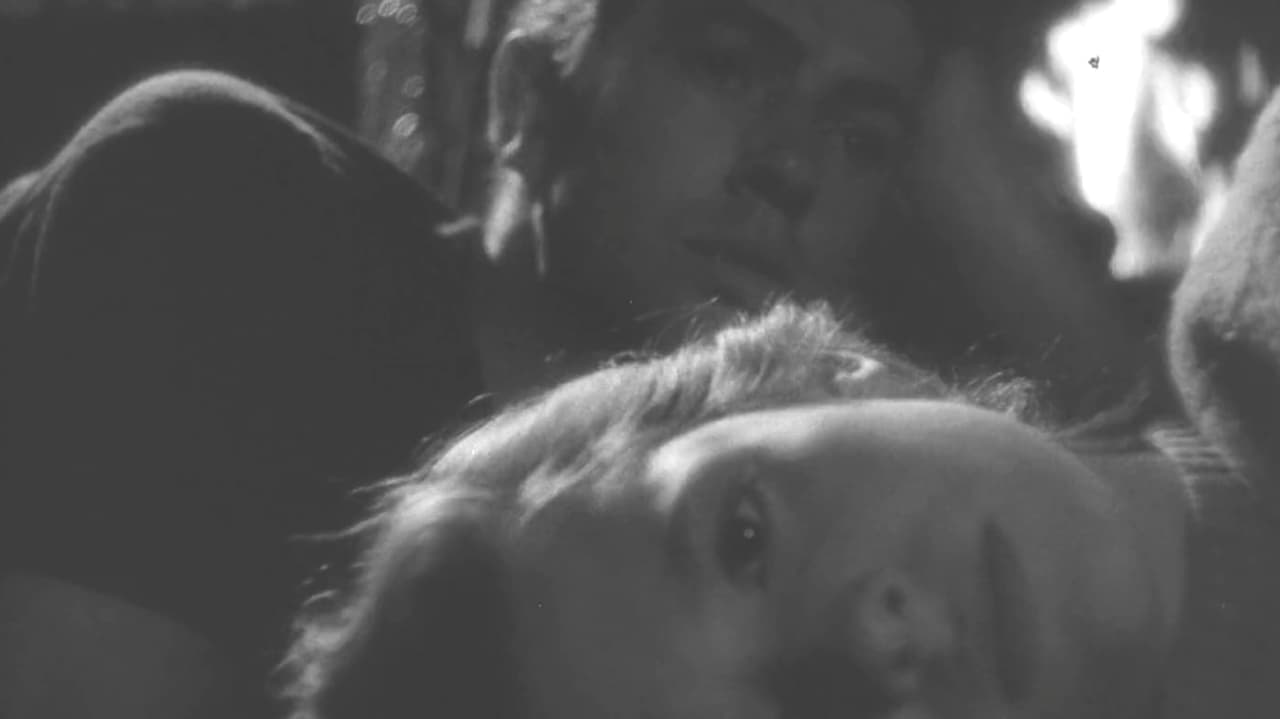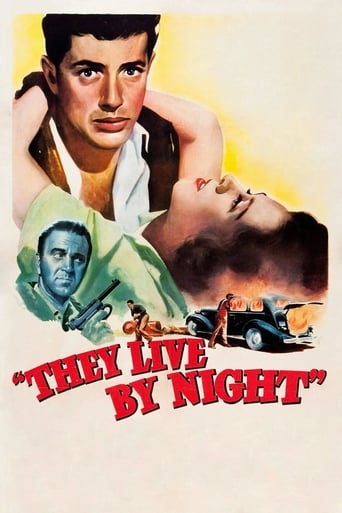Matialth
Good concept, poorly executed.
SincereFinest
disgusting, overrated, pointless
Ogosmith
Each character in this movie — down to the smallest one — is an individual rather than a type, prone to spontaneous changes of mood and sometimes amusing outbursts of pettiness or ill humor.
Cissy Évelyne
It really made me laugh, but for some moments I was tearing up because I could relate so much.
lasttimeisaw
This Film-Noir-inflected directorial debut feature of maverick US filmmaker Nicholas Ray is headlined by two young stars on the rising, Farley Granger and Cathy O'Donnell, as their escapist romance is par for the course of a sorry denouement which tallies with the now stock "lovers on the run" scenario, to today's audience, it is Ray's audacious craftsmanship leaving a hefty mark on the route. Adapted from Edward Anderson's novel THIEVES LIKE US (from which Robert Altman would regurgitate his own version using the book's original title in 1974), the storyline revolves around a young convict Bowie (Granger), who escapes from prison with two senior bank robbers, Chicamaw (Da Silva, flaunting with his snarky, one-eyed menace to great effect) and T-Dub (Flippen, sports a hostile ruggedness likens Michael Shannon). After falling in with Keechie (O'Donnell), the daughter of their accomplice Mobley (Wright), Bowie develops a liking for her, when a road accident leaves Bowie in the caring hands of Keechie, they decide to elope, leaving everything behind, whether it is police force or Bowie's partners in crime. Notably, the film vigorously lunges its opening gambit of chopper-aided aerial shots when the credits roll, quite a cutting-edge feat of its time, but if one thinks for granted that the movie would be heavy on the action front, a sly Ray proves otherwise, he spares us with all the robbery fracas and the upshots of peripheral players, because the movie's focus is unflinchingly zoomed in on the star-crossed lovers, close-ups expressively inspect their indecision, immaturity, callowness, but also their steely determination of finding a way out in spite of the mounting obstruction, Granger and O'Donnell both elicit emotively heart-rending renderings without any help of plot machinations, their ending is foreseeable miles away, they are mired in a cul-de-sac, catching up with a scintilla of hope and affection before it's too late. Which is to say that in Ray's fabrication, one cannot help but discerning an overt proclivity for fatalism, a heady profusion of gloom, angst, and agitation, that would evolve into Ray's trademark in the years to come. Even in the supposedly jolly strains of YOUR RED WAGON interlude, Ray manifestly shows us the singer (Bryant), cadging cash out of punters and then brandishing it in front of our eyes, that's the world which entraps the two lovebirds, materialistic, corrupted and voracious. Amongst the ragbag of supporting group, on the one hand, stage old-hand Helen Craig rounds out her celluloid debut with a stolid veneer cracked with tangible tinge of compunction in a femme fatale role; and on the other hand, productive character actor Ian Wolfe gives our two wet-behind- their-ears protagonists a good run for their money as the grasping matrimony officiator, who effortlessly hammers that last nail in their coffin without much of self-awareness. By and large, THEY LIVE BY NIGHT has professed to be an auspicious point of departure for an auteur-in-the- making, and of course, the best is yet to come.
Dan Franzen (dfranzen70)
In Nicholas Ray's seminal crime drama They Live by Night, injured bank robber Bowie (Farley Granger) falls for the independent young rancher's daughter Keechie (Cathy O'Donnell), and the two use Bowie's ill-gotten gains to distance themselves from the authorities and the rest of Bowie's gang.Bowie is the gang's wheelman, and when he's injured during a getaway, it's his newfound companion Keechie who gets to nurse him back to health while the others - Chickamaw (Howard da Silva) and T-Dub (Jay C. Flippen) - make themselves scarce. Keechie doesn't think much of her patient and his lifestyle. And make no mistake, Bowie feels little shame in his role, which has included murder. No bright-eyed neophyte, he. But there's something about Keechie, her deliberate movements, her slinky smile, that really appeals to Bowie, and the two slowly fall for each other.The first shot by Ray (in his directorial debut) is an early helicopter angle, as the bad boys speed down a rural road as they escape from jail. In fact, it's the first helicopter action shot, as previous uses of the vehicle were simply to shoot landscapes to set a scene. In any event, a tire is blown and the gang heads toward a farmhouse, where they meet farmer Mobley (Will Wright) and his daughter Keechie. There's chemistry just dripping between Granger and O'Donnell; both seem more naive than they truly are, and although each pretends to dislike the other, it's not long before them old hormones come a-knocking, although not too much, because this is 1948, after all, and the movie's set some 15 years earlier. On the run they go! Ray's first feature is strikingly shot. Aside from that iconic opening helicopter shot, there's also a great little scene of the gang pulling off a job - from Bowie's perspective as the driver. A bystander tries to engage Bowie in conversation just as T-Dub and Chickamaw run out of the building, earning him a rough shove to the face. That's noir film for you. Watch your face! O'Donnell and Granger work very well together (no surprise, since the latter recommended the former for the role), although I think most of the appeal comes from O'Donnell, who turns in a graceful, passionate, and unique performance as the trusting Keechie. Granger, appearing in only his third film (with Rope on the horizon) was never really that good of an actor, and so many of his lines are delivered in an almost nonchalant monotone that you wonder if some lessons weren't in his immediate future. At least no one can accuse him of hamming it up.And do you know who produced this masterpiece? None other than the great John Houseman, who most of us remember from his old Smith-Barney commercials but who was also one of Orson Welles' Mercury Theatre performers back in the day. The man knew talent, and he picked Nicholas Ray to direct without input from the studio. It's to Houseman's credit that the movie's as good as it is - which is to say, a true noir classic. There may not be a Bonnie and Clyde ending, but we're not talking about a Disney finale, either. Bonus cameo - the jeweler who sells Bowie a watch is played by none other than Will Lee. Yes, the same Will Lee who would go on to play Mr. Hooper on Sesame Street.
LeonLouisRicci
The excellent side Characters in this overly romantic Film-Noir are more interesting than the two love-struck leads. So is the dark atmosphere and incredible look of the Movie. Where it falters is the extreme naiveté of the Couple that becomes a bit irritating. "I don't know how to kiss, you'll have to show me".A farm Girl uttering such silly nonsense is just not wholly believable even in the Forties. They are both portrayed as such innocents that it is really too much. But if you can forgive some of the more whispering Romance scenes there is enough here to recommend as a Film-Noir with more Romantic notions than most.It can be quite engaging at times but is bogged down again and again by more school-kids playing house kind of stuff. Fortunately their Dream Life is interrupted just in time before it becomes unbearable. The world of Film-Noir is penetrated here with idealism and hope, but there is just no way that any of that will do in this perpetually bleak place. In the end, they both come to that realization.
man_out_of_time
To see this masterpiece for the first time last night on the big screen at the Film Forum. (Well, as big as the screens get at that theater.) And after the film concluded, the film programmer, Bruce Goldstein, delivered a wonderful surprise to the audience: Farley Granger was in the house! Mr. Granger (looking very handsome) stood up and recalled how wonderful it was to work with Nicholas Ray on his directorial debut. He noted that Ray had been working in theater with Elia Kazan and implied that may have accounted for how skillful he was in directing actors. He also observed that, based on a few of his later films, he thought Ray had eventually gone "a little crazy," but that he was in his creative prime for this film. Boy, was he!

